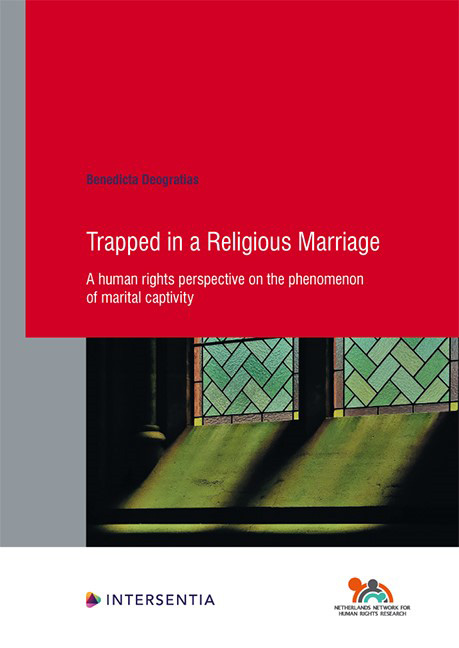Book contents
- Frontmatter
- Contents
- List of Frequently Used Abbreviations
- Chapter 1 Introduction to Marital Captivity
- Chapter 2 Religious Barriers to Divorce
- Chapter 3 Marital Captivity in the Netherlands
- Chapter 4 Marital Captivity and the Freedom of Religion
- Chapter 5 The Right to Divorce
- Chapter 6 The Trapped Spouse’s Rights
- Chapter 7 Violence Against Women
- Chapter 8 Conclusions
- Bibliography
- Curriculum Vitae
- Human Rights Research Series
Chapter 7 - Violence Against Women
Published online by Cambridge University Press: 22 December 2020
- Frontmatter
- Contents
- List of Frequently Used Abbreviations
- Chapter 1 Introduction to Marital Captivity
- Chapter 2 Religious Barriers to Divorce
- Chapter 3 Marital Captivity in the Netherlands
- Chapter 4 Marital Captivity and the Freedom of Religion
- Chapter 5 The Right to Divorce
- Chapter 6 The Trapped Spouse’s Rights
- Chapter 7 Violence Against Women
- Chapter 8 Conclusions
- Bibliography
- Curriculum Vitae
- Human Rights Research Series
Summary
The inability of women to initiate and obtain a divorce and the dependency on the husbands’ cooperation to the dissolution of the religious marriage naturally places women in a vulnerable position. The unequal power arrangements between wives and husbands on divorce matters, enables husbands not only to gain control over their (ex-) wives ability to leave the relationship, but it also enables husbands to abuse and exploit their wives. The case of Aya illustrates the vulnerable position of trapped women:
Aya married against the wishes of her parents at the Moroccan consulate in the Netherlands. It was not a happy marriage. In fact, it was a violent marriage. Eventually, she managed to escape the violent marriage. She says about this situation: ‘it was a very traditional family, a religious family too (…) divorce…that was just something you did not do, if your husband hit you, then you just had to accept that’. For years her husband refused to cooperate to the Moroccan divorce. Aya: ‘I had then said: I don't care anymore, even if I never get divorced, I don't care‘(…) and when I said ‘leave it[ the divorce]’ he apparently realised that ‘it [the divorce] doesn't interest her any more’, and only then did he undertake action [to cooperate to the divorce]’. Eventually, the husband was compelled to cooperate to the divorce in Morocco. In the divorce agreement, Aya relinquished all her rights in exchange for the divorce- ‘I had to give up everything because otherwise he would not cooperate.
Trapped women are thus in a vulnerable position and are at risk of abuse, violence and other forms of harmful practices such as extortion, intimate partner violence, honourrelated crimes and child abduction. Besides creating conditions that foster abuse of and violence against wives, situations of marital captivity may also create difficulties for spouses who attempt to leave a violent relationship and environment, as both spouses may still be expected to comply with their marital obligations. The existing marriage may then be used, by the violent spouse, to claim entitlements from the trapped wife. A situation of marital captivity may contribute to and exacerbate violence within the marriage.
- Type
- Chapter
- Information
- Trapped in a Religious MarriageA Human Rights Perspective on the Phenomenon of Marital Captivity, pp. 251 - 324Publisher: IntersentiaPrint publication year: 2020



